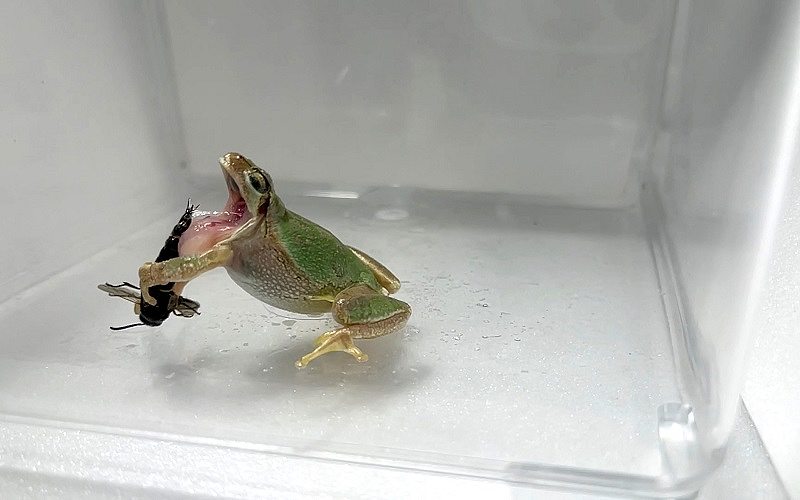
A male mason wasp uses its genital spike to sting a frog trying to eat the wasp at a lab in Kobe in July.
15:17 JST, December 28, 2022
TOKYO (AFP-Jiji) —An accidental sting has helped Japanese scientists prove some male wasps have a rather unusual predator defense weapon: penis spikes.
While wasps are known for their prickly attacks, only females have a real sting in their tails. Their male counterparts generally evade predators by mimicking the fairer sex.
Scientists had theorized that some male wasps might have other defense mechanisms, including perhaps deploying their genital spikes.
“However, the evidence was lacking,” explained Shinji Sugiura, an ecologist at Japan’s Kobe University.
Sugiura studies animal anti-predator defenses, but it was only by chance that he investigated the unusual male wasp mechanism, after his graduate student and coauthor reported being stung by a mason wasp.
“I tried to be stung after hearing her experience,” Sugiura told AFP.
“Because I had believed male wasps as harmless, I was very surprised to experience the pain.”
Female wasps sting via an ovipositor, a tube-like protrusion that deposits eggs but can also deliver a venomous riposte.
Male wasps lack the organ but are equipped with two large spikes that sit either side of their penis.
To test the effectiveness of this defense, Sugiura’s team offered up male mason wasps to two different kinds of frogs to see how the spikes were deployed.
“Male wasps were frequently observed to pierce the mouth or other parts of frogs with their genitalia while being attacked,” Sugiura reported in research published Dec. 20 in the Current Biology journal.
The attacks are documented in a video that shows an unfortunate frog trying repeatedly to chomp down on a wasp, before using its front feet to pull the stinging insect out of its mouth.
Pond frogs happily ate all the males, as well as stinging females, but over a third of tree frogs rejected the male wasps after being stung.
When the experiment was repeated with the genital spikes removed from the wasps, the tree frogs no longer held back and ate them without hesitation.
“The difference was statistically significant. Even a small difference of survival could cause the evolution of anti-predator devices in insects,” Sugiura said.
There has been little research on insect genitalia outside of its role in reproduction, according to Sugiura, though the wasp defense mechanism is not entirely without precedent.
Previous research has found, for example, that some species of hawkmoth use their genitalia to emit ultrasound that jams bat sonar.
Sugiura is no stranger to uncovering some of the weirdest ways animals evade their predators.
He has documented how some beetles can escape after being swallowed, by following the digestive tract to its logical conclusion and escaping from the anus.
And he has shown that other insects can make any unfortunate toad that has eaten them vomit them back up.
He now hopes to expand his current research to determine whether other wasp families have the same genital spike defense mechanism.
Top Articles in Science & Nature
-

Japan Institute to Use Domestic Commercial Optical Lattice Clock to Set Japan Standard Time
-

Japan to Face Shortfall of 3.39 Million Workers in AI, Robotics in 2040; Clerical Workers Seen to Be in Surplus
-

Record 700 Startups to Gather at SusHi Tech Tokyo in April; Event Will Center on Themes Like Artificial Intelligence and Robotics
-

iPS Treatments Pass Key Milestone, but Broader Applications Far from Guaranteed
-

iPS Cell Products for Parkinson’s, Heart Disease OK’d for Commercialization by Japan Health Ministry Panel
JN ACCESS RANKING
-

Japan PM Takaichi’s Cabinet Resigns en Masse
-

Japan Institute to Use Domestic Commercial Optical Lattice Clock to Set Japan Standard Time
-

Israeli Ambassador to Japan Speaks about Japan’s Role in the Reconstruction of Gaza
-

Man Infected with Measles Reportedly Dined at Restaurant in Tokyo Station
-

Videos Plagiarized, Reposted with False Subtitles Claiming ‘Ryukyu Belongs to China’; Anti-China False Information Also Posted in Japan























